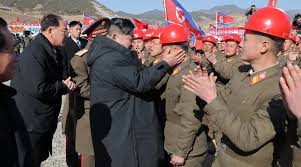Disappearance of 20 North Korean soldiers... Fate unknown

Recent reports revealed the disappearance of 20 soldiers from the elite forces of Brigade 91 in the North Korean army, after being accused of threatening the safety of leader Kim Jong Un during a military training involving live ammunition.
The reports indicated that the leader's guards noticed the soldiers looking towards Kim Jong Un while their weapons were in a ready position, a clear violation of security instructions prohibiting any visual contact or unjustified movements while the leader is present.
According to the British newspaper "The Sun," the incident has caused great concern within the North Korean security circles, being considered a serious and unprecedented threat to the leader's safety.
In response, strict punitive measures were taken against the soldiers, who have not been seen since the incident. Speculations suggest they may have been executed or transferred to forced isolation camps.
The punishment extended beyond the soldiers themselves to include their families, in a stark application of the "three generations of punishment" policy followed by Pyongyang.
According to local testimonies, some families received mysterious notifications from authorities informing them of their children's deaths without providing clear reasons or details. Some relatives who tried to investigate the soldiers' fate also disappeared. In one documented case, a soldier's father from Sariwon went to the capital to inquire about his son, only to also go missing and have his house seized in favor of a "loyal citizen to the regime."
In North Korea, "looking towards the supreme leader during live ammunition drills is an unforgivable mistake that can lead to unexpected incidents."
Despite official statements justifying the punishments as "necessary to preserve the sanctity of leadership," internal sources have expressed undisclosed resentment towards the excessive harshness in handling the incident. A military affairs insider questioned, "Is it reasonable to punish individuals and their families because soldiers looked towards the leader during training? Where is the justice of the system they fought for?"
On the other hand, Michael Madden, an expert on North Korean affairs, viewed the incident as reflecting a hidden conflict within the security apparatus, where Kim's personal guards attempted to blame the soldiers to cover up their failure in organizing the event.
Madden pointed out that Kim's guards were wearing blue combat uniforms instead of the usual official attire, indicating an unprecedented state of alert that may have raised doubts about the efficiency of the security apparatus.